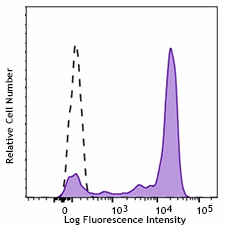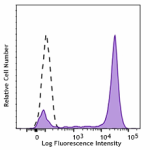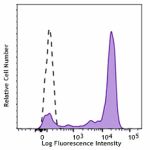- Clone
- QA18A22 (See other available formats)
- Regulatory Status
- RUO
- Other Names
- LPS receptor
- Isotype
- Mouse IgG1, κ
- Ave. Rating
- Submit a Review
- Product Citations
- publications

-

Human peripheral blood monocytes were stained with CD14 (clone QA18A22) Purified followed by PE Goat anti-mouse secondary antibody (filled histogram) or mouse IgG1, κ purified isotype control followed by PE Goat anti-mouse secondary antibody (dashed histogram).
| Cat # | Size | Price | Quantity Check Availability | Save | ||
|---|---|---|---|---|---|---|
| 398702 | 100 µg | $106 | ||||
CD14 is a 53-55 kD glycosylphosphatidylinositol (GPI)-linked membrane glycoprotein also known as LPS receptor. CD14 is expressed at high levels on monocytes and macrophages, and at lower levels on granulocytes. Some dendritic cell populations such as interfollicular dendritic cells, reticular dendritic cells, and Langerhans cells have also been reported to express CD14. As a high-affinity receptor for LPS, CD14 is involved in the clearance of gram-negative pathogens and in the upregulation of adhesion molecules and cytokines expression in monocytes and neutrophils.
Product DetailsProduct Details
- Verified Reactivity
- Human
- Antibody Type
- Recombinant
- Host Species
- Mouse
- Immunogen
- Proprietary
- Formulation
- Phosphate-buffered solution, pH 7.2, containing 0.09% sodium azide.
- Preparation
- The antibody was purified by affinity chromatography.
- Concentration
- 0.5 mg/mL
- Storage & Handling
- The antibody solution should be stored undiluted between 2°C and 8°C.
- Application
-
FC - Quality tested
- Recommended Usage
-
Each lot of this antibody is quality control tested by immunofluorescent staining with flow cytometric analysis. For flow cytometric staining, the suggested use of this reagent is ≤ 0.25 µg per million cells in 100 µL volume. It is recommended that the reagent be titrated for optimal performance for each application.
- RRID
-
AB_2820067 (BioLegend Cat. No. 398702)
Antigen Details
- Structure
- GPI-linked membrane glycoprotein, 53-55 kD
- Distribution
-
Monocytes, macrophages, granulocytes (low)
- Function
- LPS receptor, clearance of Gram-negative pathogens
- Ligand/Receptor
- LPS
- Cell Type
- Granulocytes, Macrophages, Monocytes, Neutrophils
- Biology Area
- Cell Biology, Immunology, Innate Immunity, Neuroinflammation, Neuroscience
- Molecular Family
- CD Molecules
- Antigen References
-
- Stocks S, et al. 1990. Biochem. J. 268:275.
- Wright S, et al. 1990. Science 249:1434.
- Gene ID
- 929 View all products for this Gene ID
- UniProt
- View information about CD14 on UniProt.org
Other Formats
View All CD14 Reagents Request Custom Conjugation| Description | Clone | Applications |
|---|---|---|
| PE anti-human CD14 Recombinant Antibody | QA18A22 | FC |
| Purified anti-human CD14 Recombinant Antibody | QA18A22 | FC |
| APC/Cyanine7 anti-human CD14 Recombinant Antibody | QA18A22 | FC |
| APC anti-human CD14 Recombinant Antibody | QA18A22 | FC |
| PerCP/Cyanine5.5 anti-human CD14 Recombinant Antibody | QA18A22 | FC |
| PE/Cyanine7 anti-human CD14 Recombinant Antibody | QA18A22 | FC |
| PE/Dazzle™ 594 anti-human CD14 Recombinant Antibody | QA18A22 | FC |
Compare Data Across All Formats
This data display is provided for general comparisons between formats.
Your actual data may vary due to variations in samples, target cells, instruments and their settings, staining conditions, and other factors.
If you need assistance with selecting the best format contact our expert technical support team.
-
PE anti-human CD14 Recombinant Antibody

Human peripheral blood was stained with CD15 APC and CD14 (c... 
Human peripheral blood monocytes were stained with CD14 (clo... -
Purified anti-human CD14 Recombinant Antibody

Human peripheral blood monocytes were stained with CD14 (clo... -
APC/Cyanine7 anti-human CD14 Recombinant Antibody

Human peripheral blood was stained with CD15 FITC and CD14 r... -
APC anti-human CD14 Recombinant Antibody

Human peripheral blood was stained with CD15 FITC and CD14 r... -
PerCP/Cyanine5.5 anti-human CD14 Recombinant Antibody

Human peripheral blood was stained with CD15 FITC and CD14 r... -
PE/Cyanine7 anti-human CD14 Recombinant Antibody

Human peripheral blood was stained with CD15 FITC and CD14 r... -
PE/Dazzle™ 594 anti-human CD14 Recombinant Antibody

Human peripheral blood was treated with True-Stain Monocyte ...

 Login/Register
Login/Register 








Follow Us